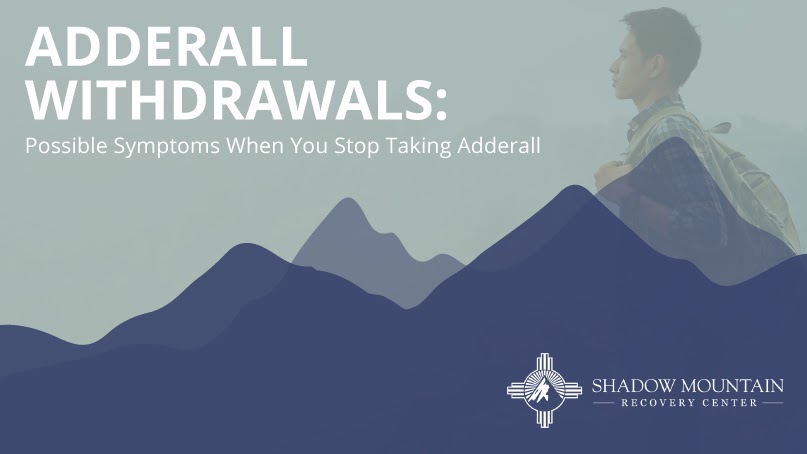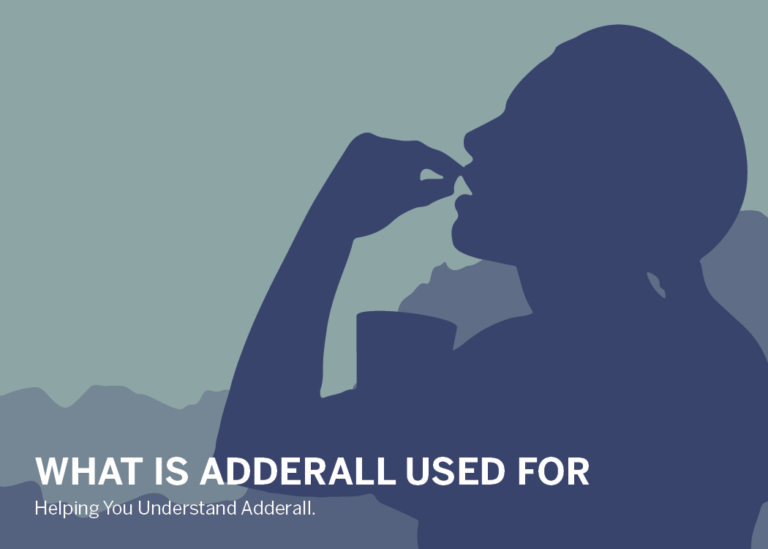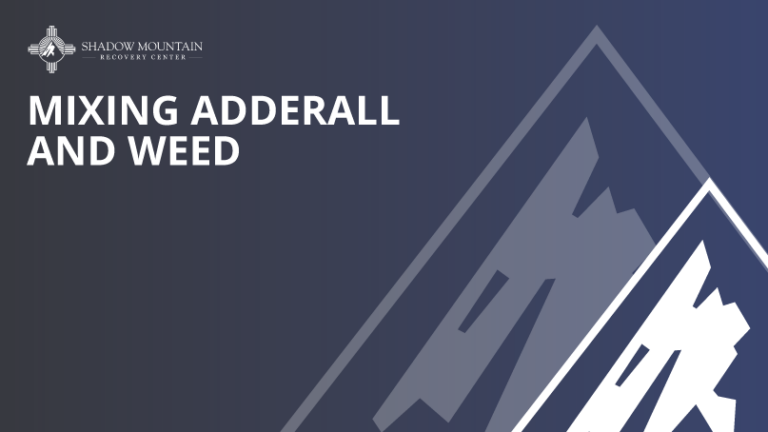Adderall Withdrawals
I’ll take it one more time to cram for this test.
Coffee isn’t working, and I need to be awake and focused. One more time can’t hurt.
For people that find themselves having these thoughts, Adderall may have become something far more dangerous than a handy tool.
Adderall is the brand name for a combination of two stimulant drugs (dextroamphetamine and amphetamine) that is commonly prescribed for people who suffer from disorders that affect focus, including attention-deficit/hyperactivity disorder (ADHD). In 2018, over 25 million prescriptions were written for Adderall, making it the 24th most prescribed drug in the United States.
Because it is so widely prescribed, the misuse of Adderall in academic circles is common. Students often turn to the drug as a way of coping with school pressures and keeping up with homework and projects. Many find that Adderall is relatively easy to get by borrowing it from a friend or family member who is prescribed the drug.
Typically, people who take Adderall without a prescription don’t set out to do so with negative intentions. These people are simply looking for a way to boost their energy and concentration to help them work more efficiently and stay focused on the task at hand.
However, with frequent, habitual consumption, Adderall — like many other substances — can be addictive. Those who rely on Adderall to get through work or to focus on tasks can find themselves feeling sluggish when working without the drug.
Adderall addiction and dependency do occur, and there is treatment available to help those who realize they have become too dependent on the drug to complete even trivial tasks without it.
Similar to what happens with other kinds of substances, when you attempt to quit taking Adderall after relying on it for so long, you can experience a whole variety of withdrawal symptoms.
Having An Adderall Prescription
As mentioned before, Adderall is prescribed for ADHD. It is also occasionally prescribed for those dealing with narcolepsy, a sleep condition that causes sudden “sleep attacks.”
While this blog post is focused on helping the reader understand the symptoms of Adderall withdrawal, we must also express that Adderall can have major benefits for those whom a prescribing doctor believes it can help.
If you are facing symptoms of ADHD or narcolepsy, you may want to discuss the option of Adderall with your doctor.
ADHD symptoms include:
- Difficulty paying attention
- Overactivity
- Interrupting people
- Organizational problems
- Constantly moving around
- Unable to stop moving around
Narcolepsy symptoms include:
- Excessive sleepiness throughout the day
- Hallucinations (seeing or hearing things that aren’t there)
- Loss of muscle control
Side Effects of Adderall
Adderall is a popular prescription drug for good reason. When prescribed by a doctor, it can do an amazing job of helping a person who faces the struggles of ADHD or even narcolepsy.
For those who don’t need it for a medical disorder and are only looking to get a buzz to help with alertness, awareness, and focus, they are risking serious side effects.
Even if you’re prescribed Adderall, taking it can cause side effects, which is why only taking it with the guidance of a medical professional is so important.
You may experience these short-term side effects from Adderall:
- Headache
- Nausea
- Dizziness
- Slurred speech
- Diarrhea
- Constipation
- Weight loss
- Dizziness
- Numbness or tingling in hands or feet
- Hallucinations
- Seizures
By taking the drug without medical supervision, you run the risk of experiencing long-term side effects as well. They include:
- Addiction
- Dependence
- Financial instability
- Job insecurity
- Expulsion from school/university
- Death
Not everyone reacts to Adderall the same way, which is why it’s crucial that you only consume it under a doctor’s supervision.
Signs of Adderall Addiction
Adderall addiction is dangerous.
While the drug, again, has many benefits for those who are prescribed it, when misused, it can derail a person’s life entirely.
Seeing an Adderall addiction is considerably harder than most other addictions because of the wide range of people who may fall into the grips of addiction to the drug.
Adderall provides many positive effects, and for that reason, there are many people who can find themselves misusing the drug. Notably, Adderall is known as “the study drug” because of how common it has become on college campuses and within offices where high-level employees work long hours.
You or a loved one may be dealing with an addiction to Adderall if you notice any of these things:
- Financial struggles due to buying Adderall without a prescription
- Simply taking Adderall without a prescription
- Requiring Adderall to work, do tasks
- Relationship troubles due to Adderall
- Accepting more tasks than you are capable of
Noticing these things can be startling, but step one in addressing any addiction is realizing there is one.
This is hard to accept, but it is indeed a massive step in reaching recovery.
Can You Overdose on Adderall?
It is entirely possible to overdose on Adderall.
An overdose is when “a person uses enough of a drug to provide a life-threatening reaction or death,” according to the National Institutes of Health.
Overdosing on prescribed stimulants typically has a few common symptoms.
They include:
- Tremors
- Restlessness
- Rapid breathing
- Fever
- Hallucinations
- Weakness
- Muscle aches and pains
- Nerve pain
- Panic attacks
In extreme cases of overdose, heart problems can occur like heart attack, seizures, high blood pressure, and irregular heartbeat.
Call 911 immediately if you see someone overdosed on a prescription stimulant like Adderall.
Adderall Withdrawal Symptoms
How long Adderall withdrawal lasts will be different for everyone. Some people may stop having symptoms in as little as five days, whereas it may take 21 days or more for others.
The biggest factors that affect how long withdrawal will last are the size of the doses taken, how often they were taken, and the length of time someone took Adderall.
Detoxing from Adderall is different from person to person, but in general, it will include a mix of symptoms that range from mild to severe.
Common withdrawal symptoms include:
- Depression
- Headaches
- Irritability
- Oversleeping
- Insomnia (sleeplessness)
- Fatigue
- Anxiety
- Muscle aches
- Nightmares
- Suicidal thoughts
More serious symptoms can occur, but they are not as common because with stimulant drugs, the symptoms are far more likely to be psychological than physical.
Serious withdrawal symptoms include:
- Seizure
- Gastrointestinal paralysis (stomach can’t empty properly)
- Stroke
- Heart palpitations
- Coma
- Death
Because of the possible severe symptoms of withdrawal from Adderall, it is always best to seek medical supervision during this time.
Adderall Detox Programs
Detoxing from Adderall, and most other stimulants, looks a lot different from what we generally think of when we think of detoxing from a drug dependence.
When most of us think of detoxing from a substance, we think of the scenes from Hollywood movies that show a person in bed, covered from head to toe with blankets and in a lot of discomfort.
Sometimes they’re nauseous and sweating profusely.
While those are common symptoms of detoxing from opioids or alcohol, Hollywood often makes it more dramatic than reality.
For detox from stimulants like cocaine, physical symptoms may occur but are not as likely.
Detoxing from Adderall leads to very few physical symptoms, but it can still be uncomfortable.
With stimulant drugs, detox is more of a psychological battle — overcoming cravings is the toughest task.
With medical supervision, detox is made far easier. As the medical staff ensures your health and comfort throughout, you are able to better focus on overcoming the strong cravings you may face.
Medications may be involved in stimulant detox as well. These medications are not quite the same as medication-assisted treatment meds (i.e. Suboxone or methadone), but they may include over-the-counter and/or prescribed medicines to increase your comfort level.
Detox is always made safer and easier with medical supervision.
Adderall Addiction Treatment
Adderall addiction treatment is similar to that for other stimulant drugs or stimulant combination drugs.
The best course of treatment often includes a mix of evidence-based treatments and alternative methods of treatment.
Evidence-based treatments are methods of treatment that have been proven over time to have benefits for those receiving them. They include your common one-on-one counseling, family therapy, group therapy, and dual diagnosis (having both a mental health disorder and a substance use disorder).
Dual diagnosis is an important step in the treatment process as it allows you to possibly uncover the root of the addiction. When there is an underlying mental health disorder, you may be able to better understand why you or your loved one began turning to substances.
Alternative methods of therapy are in place to provide a level of peace and comfort to your treatment journey. Many times these methods include yoga, mediation, hiking, or another kind of adventurous activity.
Regardless of your choice of inpatient or outpatient treatment, these treatment methods will bring you much closer to happiness and healthiness for the rest of your life.
Call Shadow Mountain
At Shadow Mountain Recovery Centers, we realize addiction is not something you plan for. That’s especially true with a drug like Adderall, the “study drug.” You or a loved one may be relying on that next dose to get through work or school and suddenly find yourself in the grasp of Adderall addiction.
With locations in Taos, Rio Rancho, Santa Fe, and Albuquerque, Shadow Mountain exists to make treatment possible while among the serenity and beauty the Southwest provides.
The process of recovery is made easier with our caring and dedicated staff.
To begin recovery for Adderall addiction or misuse, or to simply ask questions about how to help your loved one, call us today at (855) 596-0196.






